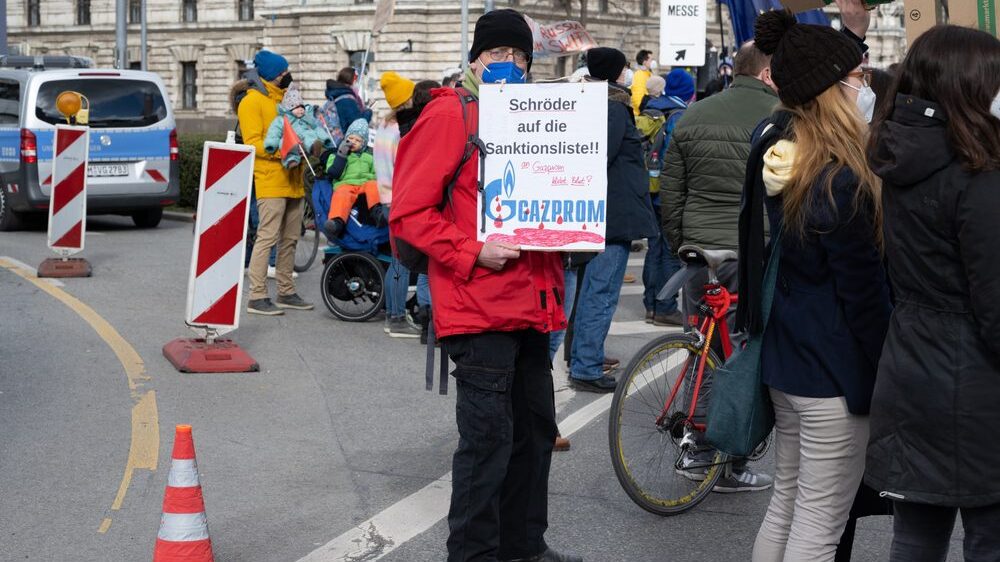
Man holding a sign at a protest against the Russian war against Ukraine, calling for former chancellor Gerhard Schröder to be sanctioned.
The Hanover District Arbitration Commission of Germany’s Social Democrats (SPD) has decided to uphold the party membership of former German Chancellor Gerhard Schröder, despite his close ties to Russian President Vladimir Putin and his involvement with Russian energy companies, Politico reported.
The commission rejected an appeal against an earlier decision made last year, which had found Schröder not guilty of violating party rules. The ruling concluded that he did not violate any party statutes, principles, or order, and that there was no evidence of dishonorable conduct or disregard for intra-party solidarity “with sufficient certainty.”
The initial ruling has been met with criticism from party members who had sought Schröder’s removal from the party. They expressed their regret at the decision and called on Schröder to leave the party voluntarily—something which the former chancellor does not seem to be interested in doing. However, it is also unlikely that members of the SPD will appeal the decision again after being rejected twice.
The decision to allow Schröder to remain a member of the party has raised questions about the party’s stance on Russia and its relationship with Putin. Some argue that Schröder’s ties to Russia compromise his ability to represent the interests of the party and the country.
Schröder’s ties to Russia have been causing controversy even before the war started, particularly his seats on the boards of Russian energy companies (such as the state-owned oil giant Rosneft, which he gave up in May after encountering immense pressure from both Germany and the EU) and also his close, personal relationship with Putin.
In May of last year, while the socialist politician was still clinging to his Rosneft position, the German parliament stripped Schröder of some of his allowances as a former chancellor, including his office space and staff—a decision that is currently being challenged by the ex-chancellor.
Described as a “friend of Putin”, he frequently attended important events in the Russian capital (including taking a front-row seat at Putin’s last inauguration in 2018), as well as praising and defending the president (for example, denying his role in the poisoning of Russian opposition activist Alexei Navalny). What’s more, since the beginning of the invasion, Schröder traveled to Moscow not once, but twice, allegedly to beg Putin for peace—but few believe him at this point.
The Hannover commission’s statement even went as far as to retroactively justify Schröder’s close links to Moscow. The decision stated that it wasn’t him but in fact other top German politicians who may have “misjudged the dangers of dependence” on Russia and that “at least before the start of the Russian war of aggression and in the first weeks after it began—he was largely guided by the desire to use his connections to end the war.”
Schröder, who served as Germany’s chancellor from 1998 to 2005, said last year that “I am and I will stay Social Democrat,” even if his party members wish the case were otherwise.
